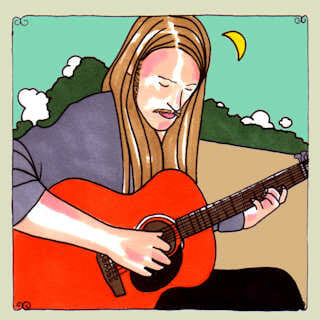- Welcome to Daytrotter
- Westbound Train
- Cemetery
- Bamboo
- Good Intentions
- Givin’ In
With “Good Intentions,” Texan musician Robert Ellis has written a song that crackles with the kind of steady and enviable tone that makes it a natural cousin of America’s “A Horse With No Name,” giving us just short of three minutes of tantalizing and moody folk rock. It’s a song that, while it should be considered the greatest achievement on his debut album, “The Great Rearranger,” is by no means its only achievement. Ellis sings on “Good Intentions,” “I don’t care how wrong it is/I’ve got good intentions/I just can’t hide it anymore/I’ve made my decision,” and it’s a statement that speaks to his general rule of thumb toward songwriting as he goes about it with his own personal intent. It makes for a hybrid of styles and experimentations, making a record of sunny times, dark times and melancholic burns, feeling as if it could have unrolled out of his soul directly following a colossal dinner, five courses, with a house full of friends and family seated around the table. The roast or steak still annoyingly lodged between a tooth here or there, some lettuce or broccoli tucked into the corner of a front tooth, a green blemish to a smile or hearty laugh. The bellies are full, the sweet whipped cream topping from the pie still not completely licked from the corners of the mouths. The dishes have been cleared, tossed into the empty sink for tackling later on in the night, before the locking of the doors and the shut-eye, and the coffees or wine is being passed around in a dimly lit den, where the conversations are turning down and the crowd is thinning some. It’s as if these songs are being eased out of Ellis’ mouth by his loved ones, by those whose pleasure it is to hear what he’s currently been writing, maybe even feeling that they’re partially what he’s been writing about as he seems to rely on those close to him when making songs. They never seem to be unimpressed and, with reason, as every Ellis song sounds like it comes from a different, even more flattering segment of his mind, a place connected but still existing in a sovereign state. The songs on “The Great Rearranger” are full of virtue and a kind of all-American way of hoping for the best, hoping for a great last act, even in the face of ugly odds. These songs sound as if they have for themselves a haven and maybe that’s where the idea of them being played in a den, after a home-cooked family dinner comes from. It’s as if they have nothing to fear and can therefore be loose and joyous, even when the subject matter is less than joyous and things are going according to plan. Luckily, Ellis knows of this haven and these songs can enjoy the very meaningful escape, knowing that there is somewhere to go that is as close to home as anything ever could be and, there, things will be alright, as they always usually are. Ellis sings, “And I keep on singing my silly little love songs/Names and faces will change/Nothing ever seems to stay the same but that train will roll on/And it’s already gone,” and it’s just a reminder that the pendulum shifts, as does the scenery, but much of it remains. There’s a different train, but it will do the same thing as the one before and it will gladly take all of these silly little love songs as passengers to the end of the rail or to no end.
